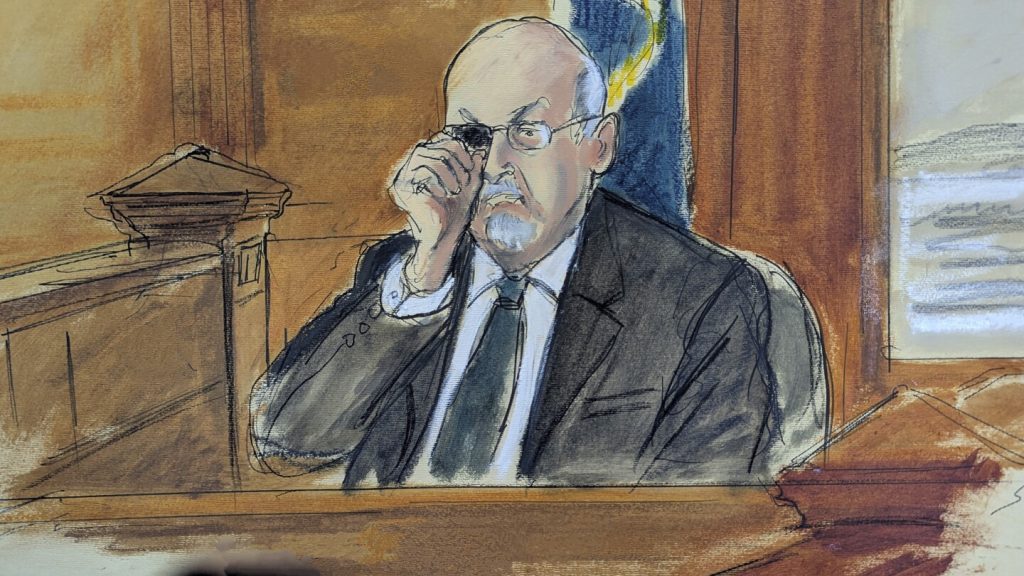The Attack: A Day That Changed Everything
On a sunny August day in 2022, the tranquil setting of the Chautauqua Institution in western New York was shattered by a violent act of aggression. Salman Rushdie, the renowned author, was on stage, preparing to speak, when a masked man rushed at him with a 10-inch knife. The attack was swift and brutal, leaving Rushdie with severe injuries. “It occurred to me that I was dying. That was my predominant thought,” Rushdie recounted to a jury on Tuesday, his voice calm and steady despite the harrowing experience. The assailant, identified as 27-year-old Hadi Matar, was quickly subdued by members of the audience, an act that Rushdie believes saved his life. The trial, now in its second day, is a somber reminder of the personal and global impact of this event.
The Trial: A Return to the Scene
Just a short drive from where the attack occurred, Rushdie, now 77, took the stand in a courtroom, facing the man who tried to end his life. This was the first time since the stabbing that the author and Matar were in the same room. In his 2023 memoir, "Knife," Rushdie referred to Matar as "the A," a term that encapsulated his disdain and refusal to acknowledge the man by name. The courtroom was tense but composed as Rushdie, dressed in a plain dark suit, spoke in an even, mild tone, even when describing the graphic details of the attack. He occasionally glanced to his right, where Matar sat about 20 feet away, but there was no sign of recognition. Matar, flanked by his attorneys, rarely raised his head during Rushdie’s testimony.
The Attack: A Moment of Terror
Rushdie’s testimony was a mix of humor and graphic detail, painting a vivid picture of the attack. "I was very struck by his eyes, which were dark and seemed very ferocious," he said, describing the brief moment he saw his attacker’s face. Initially, Rushdie thought the man was hitting him with a fist. "But I saw a large quantity of blood pouring onto my clothes," he recounted. "He was hitting me repeatedly, hitting and slashing." The attack left Rushdie with multiple stab wounds, including a severe injury to his right eye, which he now wears behind a darkened eyeglass lens. His calm demeanor and dry wit were evident when he joked to the jurors, "I don’t recommend it," referring to the painful surgery he underwent to seal his eye.
The Context: A History of Peril
The attack on Rushdie is inextricably linked to the fatwa issued by Iranian leader Ayatollah Ruhollah Khomeini on February 14, 1989, which called for Rushdie’s death over the perceived blasphemy in his novel "The Satanic Verses." For years, Rushdie lived in hiding, a profound adjustment for a man known for his sociability and engaging presence. However, after Iran announced that it would not enforce the fatwa, Rushdie’s security lightened, and he traveled freely, even announcing his Chautauqua talk months in advance. The trial is not just about the physical attack but also about the larger context of threat and fear that has shadowed Rushdie’s life for decades.
The Aftermath: Recovery and Resilience
Rushdie spent 17 days at a Pennsylvania hospital and more than three weeks at a New York City rehabilitation center, where he relearned basic skills like squeezing toothpaste from a tube. He detailed his months of recovery in "Knife," a raw and honest account of his journey back to health. "I think I’m not quite at 100%. I think I’ve substantially recovered, but it’s probably 75% to 80%," he testified. "I’m not as energetic as I used to be. I’m not as physically strong as I used to be." Despite the physical toll, Rushdie’s resilience and humor shine through, a testament to his indomitable spirit.
Support and Solidarity
In the courtroom, Rushdie’s wife, Rachel Eliza Griffiths, sat in the second row, a constant source of support. In 2022, she took an emergency private flight to be by his side after being told he was unlikely to survive. Her presence and the dedication of a chapter in "Knife" to her underscore the personal and emotional depth of the event. Griffiths cried at times during the testimony, fanning herself and gripping the hand of a friend. As Rushdie left the room after his testimony, she smiled warmly at him and clasped her hands across her chest, a silent but powerful gesture of love and solidarity. The trial is not just a legal proceeding but a deeply personal and emotional one, highlighting the human side of a global literary icon.












